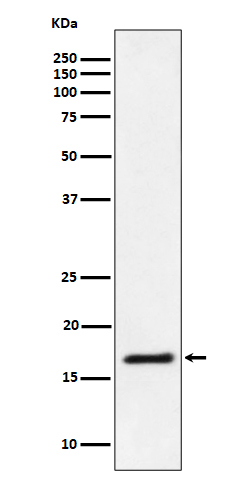
| WB | 咨询技术 | Human,Mouse,Rat |
| IF | 咨询技术 | Human,Mouse,Rat |
| IHC | IHC:1/100-1/200;IHF:1/50-1/200 | Human,Mouse,Rat |
| ICC | 1/50-1/200 | Human,Mouse,Rat |
| FCM | 咨询技术 | Human,Mouse,Rat |
| Elisa | 咨询技术 | Human,Mouse,Rat |
| Aliases | UBCE7; UbcH7; UbcM4; Ube2l3;;UBE2L3 |
| WB Predicted band size | Calculated MW: 18 kDa ; Observed MW: 17 kDa |
| Host/Isotype | Rabbit IgG |
| Antibody Type | Primary antibody |
| Storage | Store at 4°C short term. Aliquot and store at -20°C long term. Avoid freeze/thaw cycles. |
| Species Reactivity | Human,Mouse,Rat |
| Immunogen | A synthesized peptide derived from human UBE2L3 |
| Formulation | Purified antibody in PBS with 0.05% sodium azide,0.05% BSA and 50% glycerol. |
+ +
以下是关于Ube2L3/UBCH7抗体的3篇文献摘要信息:
1. **文献名称**:*"UBCH7 regulates 53BP1 stability and DSB repair"*
**作者**:Li L, Halaby MJ, et al.
**摘要**:研究揭示了Ube2L3(UBCH7)在DNA双链断裂修复中的作用,通过调控53BP1蛋白稳定性影响修复效率。文中使用UBCH7抗体进行免疫共沉淀实验,证实其与53BP1的相互作用及泛素化修饰机制。
2. **文献名称**:*"UBE2L3/UBCH7 is a critical component of the Parkin-mediated mitophagy pathway"*
**作者**:Durcan TM, Fon EA.
**摘要**:该文献发现UBCH7作为Parkin依赖的线粒体自噬关键因子,通过Western blot和免疫荧光技术(使用特异性UBCH7抗体)证明UBCH7在帕金森病模型中对受损线粒体清除的调控作用。
3. **文献名称**:*"The E2 ubiquitin-conjugating enzyme Ube2L3 regulates TNFα-induced NF-κB activation"*
**作者**:Huang Y, Liu H, et al.
**摘要**:研究利用Ube2L3抗体进行免疫印迹分析,发现Ube2L3通过介导IκBα泛素化促进NF-κB信号通路激活,从而影响炎症反应,为自身免疫疾病机制提供新视角。
以上文献均涉及Ube2L3/UBCH7抗体的实验应用,涵盖DNA修复、神经退行性疾病及炎症领域。
The Ube2L3 (Ubiquitin-Conjugating Enzyme E2 L3), also known as UBCH7. is a member of the E2 ubiquitin-conjugating enzyme family, which plays a critical role in the ubiquitin-proteasome system (UPS). This enzyme facilitates the transfer of ubiquitin to substrate proteins, a process essential for protein degradation, signaling, and regulation. Ube2L3/UBCH7 specifically interacts with HECT-type E3 ligases, such as Itch and NEDD4. to mediate the ubiquitination of targets involved in immune response, cell cycle control, and apoptosis. Dysregulation of Ube2L3/UBCH7 has been implicated in autoimmune diseases (e.g., lupus, rheumatoid arthritis) and cancers due to its role in modulating inflammatory pathways and oncoprotein stability.
Antibodies targeting Ube2L3/UBCH7 are widely used in research to study its expression, localization, and function in cellular mechanisms. They are critical tools for techniques like Western blotting, immunoprecipitation, and immunofluorescence, enabling the detection of protein interactions and post-translational modifications. These antibodies also aid in exploring disease mechanisms, particularly in conditions linked to UPS dysfunction. Validation of specificity is essential, as cross-reactivity with other E2 enzymes can occur. Commercially available antibodies are typically raised against conserved epitopes, ensuring reactivity across human, mouse, and rat samples, which supports translational research in diverse experimental models.
×